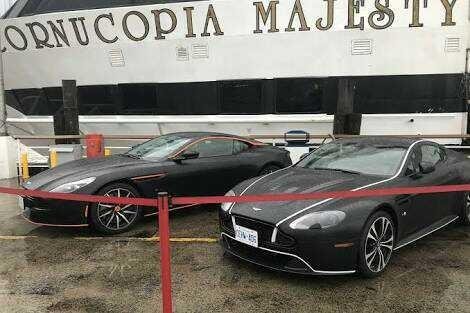Inside the extravagant money and parties that define cryptocurrency craze
Kirby Chicas quit his job as a General Electric account manager in Toronto a few months ago to chase a dream he’s had for years — to help start a revolution in bitcoin-like cryptocurrencies.
Just three weeks into his new job at a startup called Decentral, the 29-year-old engineer was whisked to New York for a blowout party Wednesday night to mark his company’s debut.
One of Chicas’ party-night jobs was to hand out white electronic wristbands that would light up to the beats the party’s DJ was putting down. And oh yeah, two of the wristbands would light up post-party to alert the lucky winners of a couple of $250,000-plus Aston Martin sports cars.
The party, a six-hour cruise to the Statue of Liberty and around Upper New York Bay, capped a crazy week of crypto-currency conferences around the Big Apple.
On display at the conferences was one of the most ostentatious displays of wealth that New York has seen since the peak of the subprime mortgage boom more than 10 years ago.
An 18-fold run-up in bitcoin value in 2017 and some $13 billion in money raised for other crypto-assets will create that kind of ostentatiousness.
Modal Trigger A crowd of crypto true believers. Kevin Dugan
During the week one company, Ripple, had wrangled Snoop Dogg to play a private show in the West Village for about 200 people. The rap star later showed up to an after-party at 1 Oak and was joined by celebrities from A-Trak to James Murphy, founder of LCD Soundsystem.
In that regard, Wednesday’s Decentral party was just another $3 million crypto-blowout.
Decentral, a new venture by Ethereum co-founder Anthony Di Iorio, 43, rented out the 210-foot party yacht Cornucopia Majesty.
The company is launching an app in July which, Di Iorio says, will be like his industry’s Netscape, and allow anyone to invest in cryptocurrencies.
But really, the event was a coming-out party for a new, and suddenly wealthy industry that has few regulations and isn’t chastened by scandals that have held back Wall Street and now Silicon Valley.
Thanks to barely-there government oversight and a gold-rush mentality surrounding bitcoin, people have flocked to start their own copycat coins which, they hope, will be the next big thing.
“It’s perplexing,” said David Tran, a VP of marketing at Coinberry, a trading app that hopes to continue bringing cryptro-currencies to the mainstream and to shed its image as mainly being used by drug dealers. “It feels like the 1990s internet.”
As a partygoer asked Tran about his company, another attendee sidled up and shouted, “Coinberry!” — wrapping his arm around Tran.
“I love Coinberry,” said the man who was suddenly Tran’s best friend. “I’m, like, a criminal, and I got verified [cleared to trade on Coinberry] right away.”
As the yacht, — with its 30,000 square feet of party space — pulled out of Pier 81 on Manhattan’s West Side, scores of young women wrapped in form-fitting black party dresses paired off with boyfriends or just mingled among schlubby guys in T-shirts or Wall Street pros.
More On:
digital currency
SEC uses mock website to warn investors about cryptocurrency
Cryptocurrency could see major crackdown from regulators
Judge: Man's cryptocurrency is 'grand misrepresentation'
Berkshire execs bash bitcoin as 'rat poison,' 'worthless' and a 'turd'
Dudes with neck tattoos got into the scene — as a guy wearing a space helmet floated around the dance floor.
One young woman, who wore custom athleisure tights that featured a blockchain code print, added a bit of fashion to the scene — as did a fop who showed off his unreleased Yeezy kicks.
Around midnight, perhaps the booze was getting the better of at least one partygoer, who seemed to step straight out of “The Wolf of Wall Street” set.
“Do you want a Russian?” the young crypto bro asked a fellow reveler, gesturing to a thin brunette in a black dress.
The woman then smacked the man in the face. “I’m Ukrainian,” she said.
Di Iorio, who said he shelled out his own money to pay for the cruise, flew in from London his favorite DJ, Chicane, to play house music for the 1,000 attendees.
As the party yacht made a turn near the Statue of Liberty, one attendee reflected on the rush of wealth into the suddenly flush industry.
“Yeah, I’m cool — I’m cool with making myself super-dope rich and having awesome things and getting to enjoy visages that no one else does,” said Curtis Ingleton, CEO of Refinery, a Canadian compliance startup.
“But at the same time, man, what happens to all those poor people?” Ingleton asked, gesturing toward New Jersey. “What happens to every single one of those lights that’s across the way? What do they do? At the end of the day, man, they actually need to make their day happen to make me make my day happen, so it really is my day to make sure their lives happen. It’s a huge responsibility.”
Chicas was already jazzed about crypto-currencies — even before he turned out to be one of the two lucky winners of an Aston Martin.
“You know what’s really crazy about this?” he asked post-party, standing beside his $295,000 Aston Martin Vanquish, emblazoned with the Ethereum logo at around 1 a.m. “At one point I had 13 wristbands, and I was giving them out to everybody, and I just kept the one I had initially . And I got lucky.”
